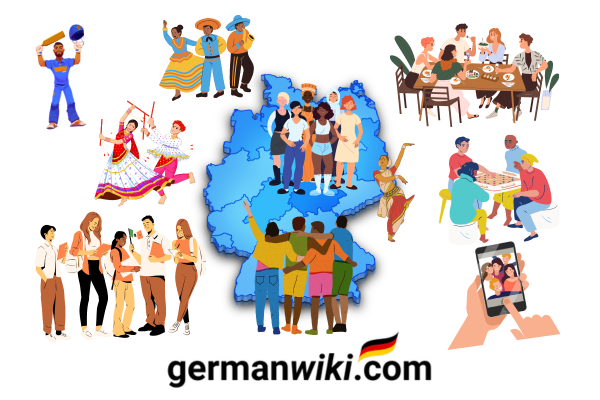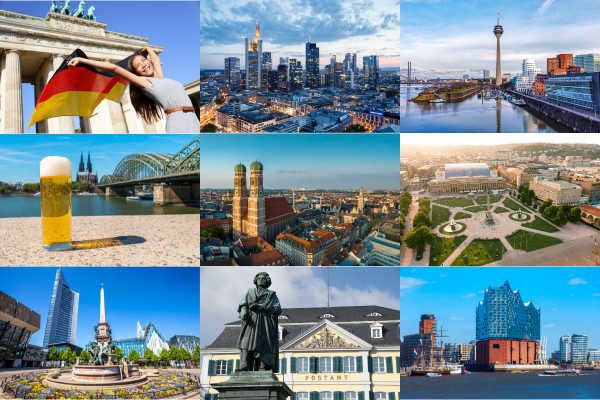Social Life in Germany
Navigating Social Life as an Expat in Germany
Moving to a new country is an exciting adventure, but it can also come with challenges—especially when it comes to building a social life. Germany, with its rich culture, diverse cities, and unique social norms, offers a wealth of opportunities to connect, integrate, and thrive socially. Whether you’re looking to make new friends, understand local customs, or simply enjoy the vibrant social scene, our collection of articles provides you with all the insights you need. From understanding German social etiquette to finding expat-friendly communities, these guides are designed to help you navigate and embrace social life in Germany with confidence and ease.
Dive into the articles below to unlock the secrets to a fulfilling and vibrant social experience in Germany.

Outline:
Making Friends in Germany: A Guide for Expats
The Role of Clubs and Societies in German Social Life
Understanding German Social Etiquette
Celebrating in Germany: An Expat’s Guide to Festivals and Holidays
Networking in Germany: Professional and Social Tips for Expats
Language and Social Integration: How Learning German Enhances Your Social Life
Dating in Germany: Navigating the Romance Culture
Expat-Friendly Cities: The Best Places to Live for a Vibrant Social Life
Navigating German Work Culture: Balancing Work and Social Life

Making Friends in Germany: A Guide for Expats
Moving to Germany can be an exciting adventure, but building a social network from scratch can be challenging. For many expats, the cultural differences and language barriers can make it difficult to form connections. However, with a little effort and the right approach, you can create a vibrant social circle that will enrich your experience in Germany.
1. Join Local Clubs and Groups:
Germany has a rich tradition of clubs and societies, known as “Vereine,” where people gather based on shared interests, from sports to music to hobbies. Joining a Verein is an excellent way to meet locals who share your passions.
2. Embrace German Social Norms:
Understanding and respecting German social etiquette is key to making friends. Germans value punctuality, direct communication, and personal space. Being mindful of these cultural norms can help you integrate more smoothly.
3. Attend Language Classes:
Even if your German isn’t perfect, attending language classes can be a great way to meet other expats and locals alike. Practicing German in a classroom setting helps build confidence, and you’ll often find classmates who are also looking to expand their social circles.
4. Utilize Social Media and Expat Forums:
Platforms like Meetup, Internations, and Facebook groups are popular among expats in Germany. These communities often organize events, outings, and meet-ups that are tailored to newcomers, making them ideal for forming connections.
5. Be Open to Invitations:
Germans may not always be quick to extend an invitation, but when they do, it’s a sign of genuine interest in getting to know you. Accepting invites to social events, dinners, or even small get-togethers can help deepen your relationships.
Remember, building a social life in a new country takes time, so be patient and proactive. Over time, you’ll find that Germany can offer a rich and fulfilling social experience.

The Role of Clubs and Societies in German Social Life
Germany is known for its strong community culture, and at the heart of this are clubs and societies, known as “Vereine.” These clubs play a significant role in German social life, offering a space for people to come together based on shared interests. Whether you’re passionate about sports, music, crafts, or even niche hobbies, there’s likely a Verein for you.
1. Types of Vereine:
There are thousands of clubs across Germany, catering to virtually every interest. Popular types include:
- Sports Clubs (Sportvereine): Football, tennis, running, and other sports.
- Music and Arts Clubs (Musik- und Kunstvereine): Choirs, bands, painting, and crafts.
- Hobby Clubs (Hobbyvereine): Photography, gardening, cooking, and more.
2. How to Join a Verein:
Joining a Verein is straightforward. Most clubs have a small annual fee, and you can usually attend a few meetings or events before committing. To find a local club, ask around in your community or check local notice boards and websites.
3. Benefits of Joining:
Vereine offer more than just an opportunity to engage in your favorite activities. They’re also a gateway to making friends, learning about German culture, and integrating into the local community. Many clubs organize regular social events, trips, and even competitions.
4. Language Barrier:
Don’t worry if your German isn’t perfect. Many expats join clubs as a way to practice the language in a real-world setting. The social environment is often more forgiving and supportive than formal language classes.
By joining a Verein, you not only pursue your passions but also become part of a close-knit community, making your stay in Germany more enjoyable and socially fulfilling.

Understanding German Social Etiquette
Social etiquette in Germany can be quite different from what you’re used to, and understanding these nuances is key to integrating smoothly into German society. Whether you’re attending a social gathering, meeting new people, or simply going about your daily life, here are some key aspects of German social etiquette to keep in mind.
1. Punctuality is Key:
Germans are famously punctual, and being late is often seen as a sign of disrespect. Whether it’s a social event, a work meeting, or a casual get-together, always aim to be on time—or even a few minutes early.
2. Formality in Greetings:
In Germany, it’s common to use formal titles and last names, especially when meeting someone for the first time. As you get to know someone better, they might invite you to use their first name, but it’s best to wait for that cue.
3. Direct Communication:
Germans tend to be direct in their communication, valuing honesty and clarity over politeness that could be perceived as insincere. This doesn’t mean they are being rude; rather, they prefer to get straight to the point.
4. Personal Space and Privacy:
Personal space is important in Germany. Germans typically maintain a certain physical distance when interacting, and they value their privacy. It’s considered polite to respect these boundaries.
5. Table Manners:
Dining etiquette is also important. For example, it’s customary to wait until everyone has been served before starting to eat, and it’s polite to wish others “Guten Appetit” before you begin.
By being mindful of these cultural norms, you’ll navigate German social situations with greater ease and confidence, helping you to build stronger relationships and integrate more smoothly into the community.

Celebrating in Germany: An Expat’s Guide to Festivals and Holidays
Germany is a country rich in traditions, and its festivals and holidays are an integral part of the culture. For expats, these celebrations offer a unique opportunity to experience German culture firsthand and connect with locals. Whether it’s the world-famous Oktoberfest or the charming Christmas markets, here’s a guide to some of the must-attend events throughout the year.
1. Oktoberfest (Munich):
Held annually in Munich, Oktoberfest is the world’s largest beer festival, attracting millions of visitors. It’s a celebration of Bavarian culture, featuring traditional music, food, and, of course, plenty of beer. Even if you’re not in Munich, many cities and towns host their own versions of Oktoberfest.
2. Christmas Markets (Weihnachtsmärkte):
Germany’s Christmas markets are magical, with festive stalls selling handcrafted goods, mulled wine (Glühwein), and delicious holiday treats. Major cities like Berlin, Cologne, and Nuremberg are known for their beautiful markets, but you’ll find them in towns and villages across the country.
3. Carnival (Karneval or Fasching):
Carnival is a lively pre-Lenten festival celebrated primarily in the Rhineland. Cities like Cologne, Düsseldorf and Aachen are famous for their parades, elaborate costumes, and street parties. It’s a time for letting loose before the austerity of Lent begins.
4. Easter Traditions (Ostern):
Easter is celebrated with various traditions, including egg hunts, Easter bonfires, and special church services. The Easter markets are similar to Christmas markets, offering seasonal crafts and delicacies.
5. Marksmen’s Fair (Schützenfest):
This traditional festival, celebrated in many towns across Germany, particularly in the north and the west, honors the skills of marksmen. Schützenfest typically includes parades, shooting competitions, and lively fairs with rides, food stalls, and music. It’s a great way to experience local traditions and community spirit, making it a must-attend event for those looking to immerse themselves in German culture. Biggest Shützenfest is in the City of Neuss in Northrhine-Westphalia.
6. Music Festivals:
There are many Music Festivals and Concerts all over Germany. You can find Classic Musik as well as Heavy Metal and Rock, Electronic Music you will find everything.
7. New Year’s Eve (Silvester):
Germans celebrate New Year’s Eve with fireworks, parties, and a traditional meal of raclette or fondue. Public fireworks displays are common, and in some regions, it’s customary to shoot off fireworks at midnight.
By participating in these festivals and holidays, you’ll not only enjoy the festivities but also gain a deeper appreciation for German culture. It’s also a great way to meet locals and feel more connected to your new home.

Networking in Germany: Professional and Social Tips for Expats
Networking is an essential skill for success in both professional and social settings, and in Germany, it requires a blend of formality and relationship-building. Whether you’re looking to advance your career, find new opportunities, or simply expand your social circle, understanding the nuances of networking in Germany can make all the difference.
1. The Importance of Formal Introductions:
In Germany, professional relationships often start with a formal introduction. Titles and last names are important, and it’s common to use them until you’re invited to switch to first names. When meeting someone new, a firm handshake and direct eye contact are expected.
2. Building Trust Through Consistency:
Germans value reliability and consistency in both professional and social relationships. Being punctual, keeping promises, and following through on commitments are key to building trust and establishing a strong network.
3. Leveraging Social Events for Networking:
Work-related social events, such as company outings, business lunches, or even after-work drinks, are valuable opportunities for networking. These settings allow for more informal interactions, where you can build rapport with colleagues and potential business partners.
4. Joining Professional Associations:
Germany has many industry-specific professional associations that hold regular events, seminars, and conferences. Joining these associations can expand your professional network and keep you informed about industry trends.
5. Online Networking:
LinkedIn is widely used in Germany, and it’s a great platform for connecting with professionals in your field. When reaching out, be polite and provide a clear reason for your connection request, as Germans appreciate transparency and purpose.
Effective networking in Germany involves a balance of professionalism and personal connection. By being consistent, respectful, and proactive, you can build a strong network that supports both your career and social life.

Language and Social Integration: How Learning German Enhances Your Social Life
Learning German is one of the most effective ways to integrate into German society and enhance your social life. While many Germans speak English, especially in larger cities, being able to communicate in the local language opens up a wealth of opportunities for deeper connections and a more fulfilling experience in Germany.
1. Breaking the Language Barrier:
Speaking German allows you to engage more fully in everyday conversations, whether you’re at the grocery store, a local café, or a social event. It demonstrates respect for the local culture and can make interactions smoother and more enjoyable.
2. Building Relationships:
When you speak German, even at a basic level, it’s easier to make friends and feel more connected to the community. Locals appreciate the effort and are often more open to forming relationships when they see you’re trying to speak their language.
3. Accessing Local Media and Culture:
Understanding German gives you access to local news, books, movies, and other cultural content that you might otherwise miss. This deeper engagement with German culture can enrich your experience and provide more topics for conversation with new friends.
4. Enhancing Professional Opportunities:
In the workplace, being able to communicate in German can open up more job opportunities and make it easier to navigate office culture. It also shows potential employers that you’re committed to staying and integrating into the country.
5. Language Learning Resources:
Germany offers a variety of language learning resources, from formal classes at Volkshochschulen (community colleges) to language exchange meetups and online courses. Practicing regularly, whether through formal education or casual conversation, is key to improving your skills.
Investing time in learning German not only helps you navigate daily life more easily but also enriches your social interactions and professional prospects. It’s a valuable tool for building a deeper connection with your new home.

Dating in Germany: Navigating the Romance Culture
Dating in Germany can be a unique experience, with its own set of cultural norms and expectations. Whether you’re looking for a serious relationship or just want to understand the social dynamics better, this guide will help you navigate the German dating scene.
1. Understanding German Dating Culture:
Germans are often seen as reserved, and this can extend to their dating habits. Relationships tend to develop more slowly, with an emphasis on getting to know each other before jumping into anything serious. Don’t be surprised if dates are more about meaningful conversations than grand gestures.
2. The Role of Online Dating:
Online dating is popular in Germany, with apps like Tinder, Bumble, and Parship widely used. These platforms provide a great way to meet new people, especially in larger cities. When using dating apps, be clear about your intentions and respectful of the cultural nuances in communication.
3. Traditional vs. Modern Dating Approaches:
While younger generations in Germany may embrace more modern, casual dating practices, traditional values still hold sway, especially in smaller towns and among older individuals. It’s important to gauge the expectations of the person you’re dating and discuss what you’re both looking for.
4. Dating Etiquette:
German dating etiquette can differ from what you might be used to. For instance, the concept of “going Dutch” (splitting the bill) is common, and punctuality is valued even in a casual dating context. Directness in communication is appreciated, and playing games or being overly coy may not be well-received.
5. Long-Term Relationships and Commitment:
Once a relationship becomes serious, Germans are typically committed and loyal partners. Discussing future plans, such as moving in together or getting married, is usually approached with careful consideration and mutual agreement.
Navigating the German dating scene requires an understanding of both traditional values and modern practices. By being respectful, honest, and aware of cultural differences, you can build meaningful connections in Germany.

Expat-Friendly Cities: The Best Places to Live for a Vibrant Social Life
Germany is home to many vibrant cities that offer a rich social life, especially for expats. Whether you’re looking for cultural experiences, social gatherings, or just a lively atmosphere, these cities are known for their expat-friendly environments.
1. Berlin:
As Germany’s capital, Berlin is a melting pot of cultures and a hub for creativity and innovation. It’s known for its diverse social scene, with countless bars, clubs, cultural events, and expat meetups. The city’s open-minded vibe makes it easy to connect with people from all walks of life.
2. Munich:
Munich combines traditional Bavarian charm with a cosmopolitan atmosphere. The city is famous for its beer gardens, festivals, and a high quality of life. Expats in Munich can enjoy a mix of cultural events, outdoor activities, and a welcoming social scene.
3. Hamburg:
Hamburg, with its maritime spirit, is known for its vibrant music and arts scene. The city offers a range of social activities, from harbor tours to music festivals, making it a great place for expats to explore and connect with others.
4. Frankfurt:
Frankfurt is Germany’s financial center and a global business hub. Its international population makes it one of the most expat-friendly cities in the country. Networking events, cultural festivals, and a dynamic nightlife offer plenty of opportunities to socialize.
5. Düsseldorf:
Düsseldorf is known for its fashion, arts, and a thriving expat community. The city hosts numerous events, including the famous Carnival, and has a variety of international restaurants and social clubs that cater to expats.
6. Stuttgart:
Stuttgart offers a mix of urban living and access to nature, with its many parks and nearby vineyards. The city is home to a large number of international companies, making it a popular destination for expats. Social opportunities abound through cultural events, wine festivals, and outdoor activities.
7. Leipzig:
Leipzig is an up-and-coming city with a growing expat community. Known for its affordable living and burgeoning arts scene, Leipzig offers a vibrant social life with plenty of opportunities to connect with locals and other expats.
8. Cologne:
Cologne is famous for its Carnival and a lively, open-hearted atmosphere. The city’s extensive network of expat groups and social events makes it easy to integrate and enjoy the local culture.
9. Bonn:
As a smaller city with a rich history, Bonn offers a quieter, more relaxed pace of life. However, its international population, due to institutions like the United Nations, provides ample opportunities for socializing.
10. Heidelberg:
Heidelberg is a picturesque university town with a strong academic and international community. Its charming old town, combined with a lively student population, creates a unique social environment.
Each of these cities offers something unique for expats, from cultural experiences to thriving social scenes. By choosing the city that best fits your lifestyle, you can enjoy a vibrant and fulfilling social life in Germany.

Navigating German Work Culture: Balancing Work and Social Life
German work culture is known for its efficiency, professionalism, and clear boundaries between work and personal life. Understanding these cultural nuances can help you balance your work responsibilities with a fulfilling social life in Germany.
1. The German Approach to Work-Life Balance:
Germans value a clear distinction between work and personal life. While they work hard during office hours, they also place a high importance on leisure time. The standard workweek is 35-40 hours, and overtime is generally discouraged.
2. Socializing with Colleagues:
Work-related socializing often occurs outside of office hours, such as during after-work drinks or company outings. These events are an important aspect of networking and building relationships with colleagues. However, keep in mind that while Germans may socialize with colleagues, they often maintain a level of formality and may not blur the lines between work and personal relationships.
3. Punctuality and Efficiency:
Punctuality is a cornerstone of German work culture. Meetings start on time, and deadlines are taken seriously. This respect for time extends to social interactions as well, where being on time is seen as a sign of respect.
4. The Role of Titles and Formality:
In the workplace, titles and formalities are important. Addressing colleagues and superiors by their titles and last names is common until you are invited to use first names. This formality can also influence social interactions, where initial meetings may be more reserved.
5. Taking Breaks Seriously:
Germans take their breaks seriously, particularly the lunch break, which is often seen as a time to recharge rather than continue working. It’s common for colleagues to eat together during this time, offering an opportunity for social interaction in a more relaxed setting.
6. Understanding the Vacation Culture:
Germany’s generous vacation policies reflect the value placed on work-life balance. It’s typical for employees to take extended vacations, and using up all allocated vacation days is encouraged. This time off is respected, and it’s uncommon to be contacted about work matters during vacation.
By understanding and respecting German work culture, you can find a balance that allows you to be productive at work while enjoying a rich social life outside of it. Embracing these cultural differences will help you integrate smoothly into both the workplace and the community.

Volunteer Opportunities in Germany: Connect and Contribute
Volunteering is a wonderful way to connect with the local community in Germany, meet new people, and give back to society. Whether you’re passionate about social causes, environmental conservation, or helping the less fortunate, there are numerous volunteer opportunities that can enrich your social life and provide a sense of fulfillment.
Types of Volunteer Work Available:
Germany offers a wide range of volunteer opportunities, including:
Social Services:
Help at shelters, food banks, or elderly care homes
Environmental Conservation:
Engage in activities like tree planting, wildlife preservation, and environmental education. Many organizations focus on protecting Germany’s natural landscapes, rivers, and forests.
Refugee Support Services:
Assist refugees in integrating into German society by teaching language classes, helping with job applications, or providing social support through various NGOs and community programs.
Youth Mentorship Programs:
Get involved with local schools or community centers by mentoring young people, helping with homework, organizing extracurricular activities, or offering career guidance.
Cultural and Heritage Preservation:
Volunteer with museums, cultural centers, or heritage sites to help preserve Germany’s rich history. This might involve organizing events, guiding tours, or supporting archival work.
These volunteer opportunities not only allow you to give back to the community but also help you to connect with others and immerse yourself in German culture.
Disclaimer:
The information provided in this blog post is for general informational purposes only and does not constitute tax, legal, or financial advice. While we strive to ensure the accuracy and timeliness of the information, tax laws are complex and subject to change. We recommend consulting with a certified tax advisor for advice tailored to your individual circumstances. In terms of financial consultation, we collaborate with German Sherpa Financial Solutions, specializing in services for Expats in Germany. Please note that this content does not serve as tax consulting.
Why Are Expats Leaving Germany? Is Moving and Settling in Germany Still Worth It?
Why Are Expats Leaving Germany? Is Moving and Settling in Germany Still Worth It? Germany…

